- Home
- Quizzes
- My Quiz Activity
- Newsletters
- Sports Betting
- MY FAVORITES
- Add Sports/Teams
- SPORTS
-
NFL
- NFL Home
- Arizona Cardinals
- Atlanta Falcons
- Baltimore Ravens
- Buffalo Bills
- Carolina Panthers
- Chicago Bears
- Cincinnati Bengals
- Cleveland Browns
- Dallas Cowboys
- Denver Broncos
- Detroit Lions
- Green Bay Packers
- Houston Texans
- Indianapolis Colts
- Jacksonville Jaguars
- Kansas City Chiefs
- Las Vegas Raiders
- Los Angeles Chargers
- Los Angeles Rams
- Miami Dolphins
- Minnesota Vikings
- New England Patriots
- New Orleans Saints
- New York Jets
- New York Giants
- Philadelphia Eagles
- Pittsburgh Steelers
- San Francisco 49ers
- Seattle Seahawks
- Tampa Bay Buccaneers
- Tennessee Titans
- Washington Commanders
-
MLB
- MLB Home
- Arizona Diamondbacks
- Atlanta Braves
- Baltimore Orioles
- Boston Red Sox
- Chicago White Sox
- Chicago Cubs
- Cincinnati Reds
- Cleveland Guardians
- Colorado Rockies
- Detroit Tigers
- Houston Astros
- Kansas City Royals
- Los Angeles Angels
- Los Angeles Dodgers
- Miami Marlins
- Milwaukee Brewers
- Minnesota Twins
- New York Yankees
- New York Mets
- Oakland Athletics
- Philadelphia Phillies
- Pittsburgh Pirates
- San Diego Padres
- San Francisco Giants
- Seattle Mariners
- St. Louis Cardinals
- Tampa Bay Rays
- Texas Rangers
- Toronto Blue Jays
- Washington Nationals
-
NBA
- NBA Home
- Atlanta Hawks
- Boston Celtics
- Brooklyn Nets
- Charlotte Hornets
- Chicago Bulls
- Cleveland Cavaliers
- Dallas Mavericks
- Denver Nuggets
- Detroit Pistons
- Golden State Warriors
- Houston Rockets
- Indiana Pacers
- Los Angeles Clippers
- Los Angeles Lakers
- Memphis Grizzlies
- Miami Heat
- Milwaukee Bucks
- Minnesota Timberwolves
- New Orleans Pelicans
- New York Knicks
- Oklahoma City Thunder
- Orlando Magic
- Philadelphia 76ers
- Phoenix Suns
- Portland Trail Blazers
- Sacramento Kings
- San Antonio Spurs
- Toronto Raptors
- Utah Jazz
- Washington Wizards
-
NHL
- NHL Home
- Anaheim Ducks
- Arizona Coyotes
- Boston Bruins
- Buffalo Sabres
- Calgary Flames
- Carolina Hurricanes
- Chicago Blackhawks
- Colorado Avalanche
- Columbus Blue Jackets
- Dallas Stars
- Detroit Red Wings
- Edmonton Oilers
- Florida Panthers
- Los Angeles Kings
- Minnesota Wild
- Montreal Canadiens
- Nashville Predators
- New Jersey Devils
- New York Islanders
- New York Rangers
- Ottawa Senators
- Philadelphia Flyers
- Pittsburgh Penguins
- San Jose Sharks
- Seattle Kraken
- St. Louis Blues
- Tampa Bay Lightning
- Toronto Maple Leafs
- Vancouver Canucks
- Vegas Golden Knights
- Washington Capitals
- Winnipeg Jets
- NCAAF
- NCAAM
- Boxing
- Entertainment
- Lifestyle
- Golf
- MMA
- Soccer
- Tennis
- Wrestling
- More Sports
- RESOURCES
- My Account
- YB on Facebook
- YB on Twitter
- YB on Flipboard
- Contact Us
- Privacy Policy
- Terms of Service

20 facts you might not know about 'Blade Runner'
The story of Blade Runner is a complicated one. It’s got multiple versions, has been considered a flop at times, and is generally considered a sci-fi classic. The sage of the creation of Blade Runner is almost as interesting as the movie itself. How did the film come to be? Should the film have narration? Whether you are human or replicant, here are 20 facts that might intrigue you about Blade Runner.
The film is based on a novel
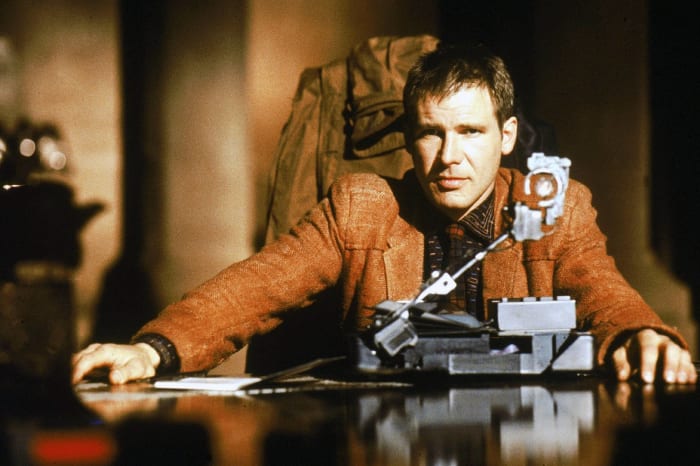
Philip K. Dıck is one of the most successful science-fiction novelists ever, and his work has been adapted on occasion. Blade Runner is based on a Dıck novel written in 1968 called Do Androids Dream of Electric Sheep? It’s a shame they didn’t use that title for the film, but we can understand the situation.
Dıck hated an early attempt to adapt his novel
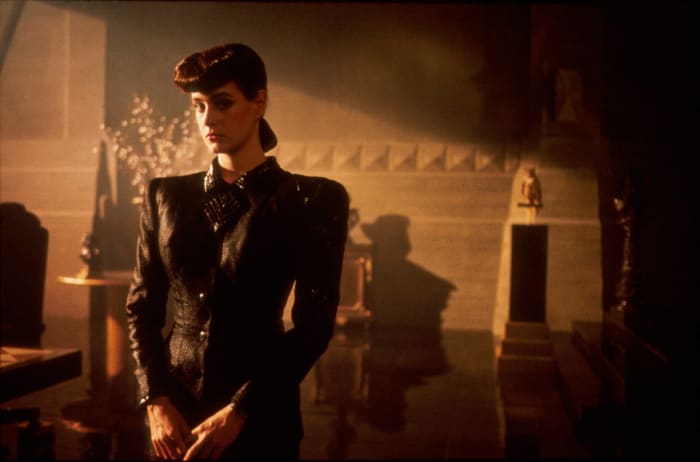
Martin Scorsese once considered adapting Dıck’s novel, though he never took the step to even option it. The first person to option Do Androids Dream of Electric Sheep? was producer Herb Jaffe. The screenplay for that film was written by Robert Jaffe, Herb’s son. Dıck, for his part, hated Jaffe’s screenplay.
Scott was slow to sign on

Eventually, the screenplay that did get traction was written by Hampton Francher (David Peoples was brought on eventually for a rewrite, and both writers get credit). Ridley Scott was approached to direct, and he was hot off the heels of his breakthrough movie Alien. However, Scott wasn’t interested at first. He was working on an adaptation of Dune, but it was taking forever. Fed up, Scott left the Dune production and agreed to direct the Dıck adaptation.
The title came from another novel

The writer Alan E. Nourse wrote a novel in 1974 called The Bladerunner. William S. Burroughs would eventually write a screenplay treatment for it, which was released as a novella called “Blade Runner (a movie).” Scott liked the title, so producer Michael Deeley bought the rights to both books solely to use the title. The Bladerunner is sci-fi, but it has nothing to do with the plot of Blade Runner.
'Blade Runner' is a future film that is now set in the past

As time marches on, more and more movies set in the future get passed on the calendar. Blade Runner is one of the most recent examples of that. The film takes place in a dystopian Los Angeles in the year 2019.
It took a while to land on the lead

When writing the script, Fancher had Robert Mitchum in mind for the role of Rick Deckard. Mitchum, a star of the ‘50s and ‘60s, would have been a decidedly older choice for the role. Scott initially honed in on Dustin Hoffman, but Hoffman eventually turned the role down because of a difference of opinions with Scott. In the end, Harrison Ford took the role, hoping to stretch his dramatic chops after making movies like Star Wars and Return of the Jedi.
Scott and Ford were exactly best buddies

Hoffman may have left the role due to creative differences, but that doesn’t mean Ford and Scott saw eye-to-eye on everything. Both have said they had a miserable time working with one another on Blade Runner. However, both have also said they patched things up in recent years and get along fine now that they aren’t trying to make a movie together.
Ford had another problem

There are multiple cuts of Blade Runner, which we will get into later, but the U.S. theatrical release features something Ford hated: narration. Ford could not stand the narration that was requested for the film. He called recording those voiceovers the worst part of the shooting and was annoyed that they were included in the theatrical release to “clarify” the film’s narrative for moviegoers.
Roy Batty was cast easily

Rutger Hauer plays Roy Batty, the leader of the renegade replicants. Scott not only considered Hauer his first choice, but he cast Hauer without ever even meeting him. The director had seen him in a few Paul Verhoeven films and cast him based on that.
Two actors contributed to their own dialogue
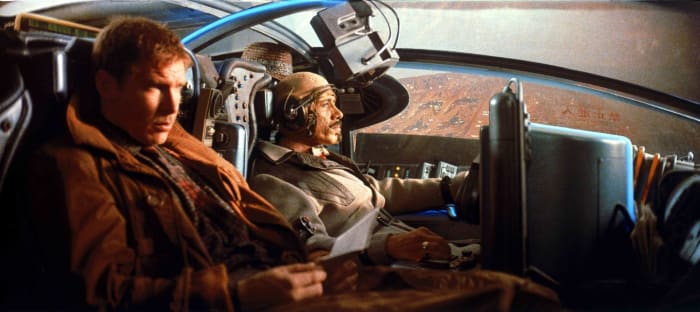
Edward James Olmos, who plays Gaff, played a role in crafting the fictional language he speaks in the film called “Cityspeak.” It’s a mix of different real languages that Olmos pulled from his background. There’s some Hungarian in the mix. Additionally, Hauer reworked his iconic “tears in the rain” speech.
As iconic building is shown in the film
The Bradbury Building in Los Angeles is famous for its staircases and ironworks. You surely remember the stairs showing up in Blade Runner at J.F. Sebastian’s apartment building. This was not the first time the Bradbury showed up in Hollywood, though. It was a staple of film noir movies for years, popping up in literally dozens of noir flicks. It’s such an iconic spot, it’s used in The Artist, a movie that is an homage to classic Hollywood.
A famous painting inspired the look of the movie
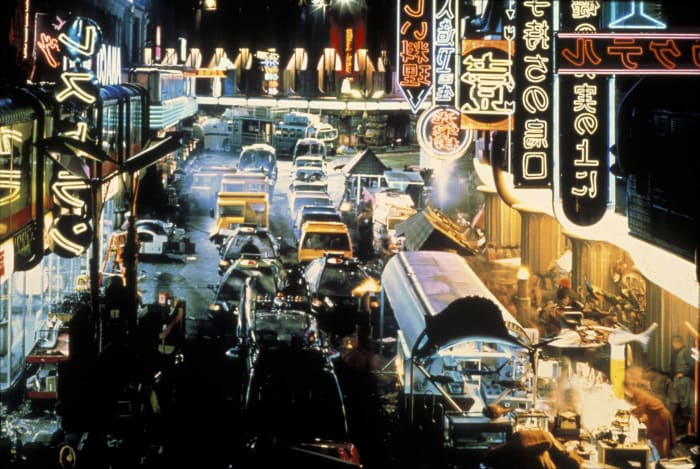
Even if you don’t recognize Edward Hopper’s “Nighthawks” by name, you’ve likely seen the painting. It’s the famed image of people in a diner late at night. “Nighthawks” was referenced by Scott as one of his influences on the style of his film.
The composer was coming off great success

Blade Runner was released in 1982. Earlier that year, the score of 1981’s Chariots of Fire won Best Original Score at the Oscars. That award was won by the Greek composer Vangelis. The singular-named musician followed that up by composing the score to Blade Runner.
Dıck did not live to see the film made

Philip K. Dıck lived long enough to see the rewritten script for Blade Runner and a 20-minute sizzle reel of Scott’s film. He was happy with what he saw, which was a bit of a surprise because Dıck was pretty skeptical of the film industry. Alas, the author died in March 1982, about three months before the film was released. It ended up being dedicated to his memory.
The film flopped

Science was having a moment in the late ‘70s and early ‘80s. We’re talking about the first three Star Wars films, Close Encounters of the Third Kind, E.T., and more. Blade Runner did not join in on the fun. It cost roughly $30 million to make, and it earned $27.5 million during its original run. Due to re-releases, it has since made about $45 million, but it was initially a flop. It also got mixed reactions from critics.
It did get two Oscar nominations, though

While critics and audiences largely shrugged off Blade Runner, it wasn’t shut out at the Academy Awards. Granted, its two nominations were for Best Art Direction and Best Visual Effects, and it didn’t win them. The film did win three BAFTAs, though, including Best Cinematography.
OK, about those different versions
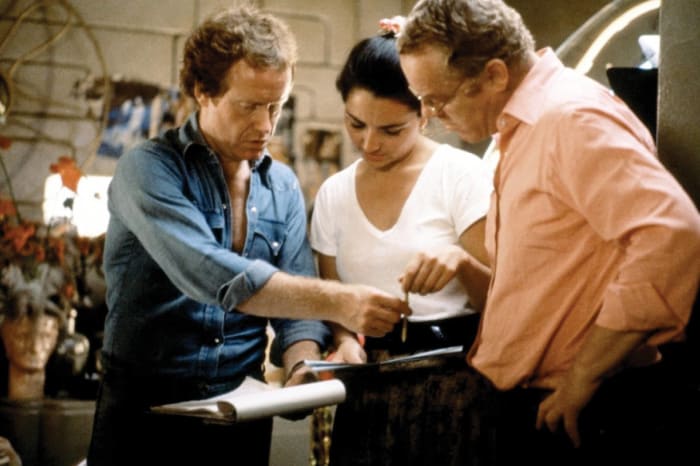
In 1982, two versions of Blade Runner were released: one in the United States and one internationally that was a bit more violent. There was also a workprint version used for test screenings before the studio imposed stuff like a voiceover on the film. For a while, that version got shown as an unofficial “director’s cut.” In 1992, Scott did indeed get a director’s cut, which was way different. It removed the voiceover and cut the “happy ending” the studio wanted. Finally, in 2007, Scott released what he called “The Final Cut.” This was the first time the director had complete control over the product and could release exactly what he wanted.
Critical consensus has turned around on 'Blade Runner'

What was once a flop is now considered a cult classic and one of the best sci-fi films ever. IGN and The Guardian both named it the best science-fiction movie of all time. Entertainment Weekly called it the ninth-best cult movie. Empire named it the 13th-best movie ever, period. It even finished 97th on the AFI’s list of the top 100 movies.
The film got a belated sequel

In 2017, we finally got a sequel to Blade Runner. Titled Blade Runner 2049 , it takes place 30 years after the action in the original. Hampton Francher returned as one of the writers, though Scott did not return to direct, with Denis Villeneuve stepping into the director’s role. Ford even returned as Rick Deckard, though Ryan Gosling is the sequel's star. Blade Runner 2049 won two Academy Awards and took home $260.5 million at the box office. Granted, it cost between $150 million and $185 million, but that’s still a bigger success than the original.
There’s still a debate about whether or not Deckard is a replicant
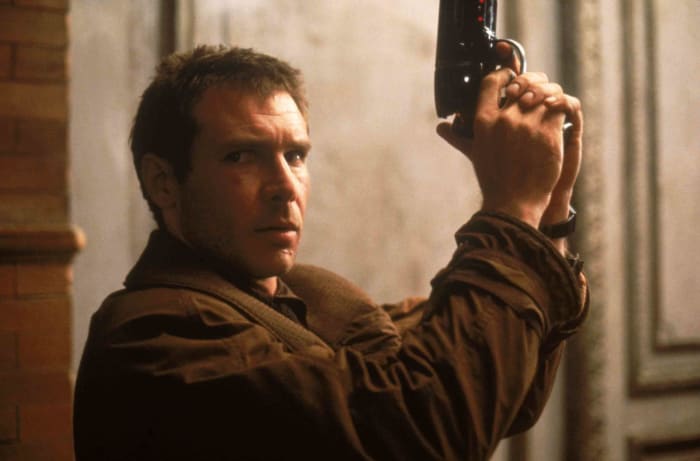
Deckard has a job as a Blade Runner chasing down rogue replicants, but is he a replicant? This is a question that has no real answer. Ford has said he believes Deckard to be human, while Scott has said he thinks he’s probably a replicant but did not go as far as to say he is definitively a replicant in his film. Villeneuve, when making the sequel, said he is unsure. Even Deckard’s dream of a unicorn in Scott’s cuts does not necessarily establish this for sure. The trivia regarding the question “Is Deckard a replicant?” is about how much debate there is even among people who worked on Blade Runner.
Chris Morgan is a sports and pop culture writer and the author of the books The Comic Galaxy of Mystery Science Theater 3000 and The Ash Heap of History. You can follow him on Twitter @ChrisXMorgan.
More must-reads:
Trending in Entertainment
Customize Your Newsletter
 +
+
Get the latest news and rumors, customized to your favorite sports and teams. Emailed daily. Always free!
Use of this website (including any and all parts and
components) constitutes your acceptance of these
Terms of Service and Privacy Policy.

